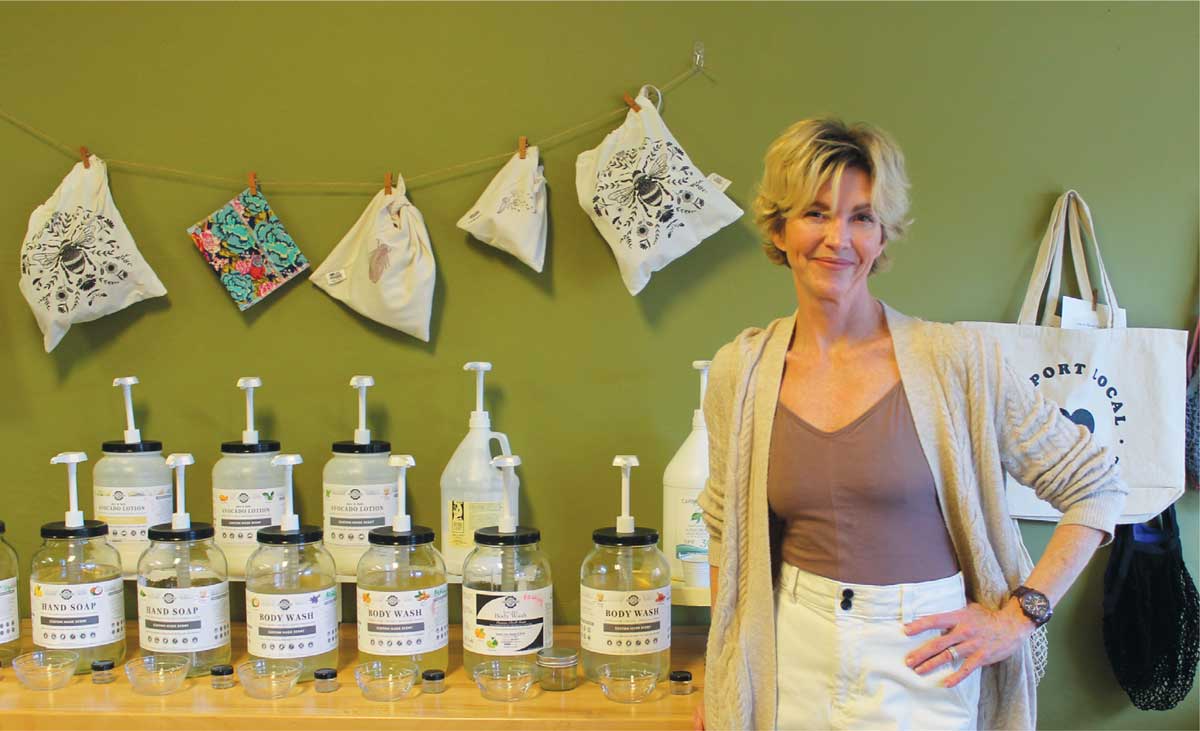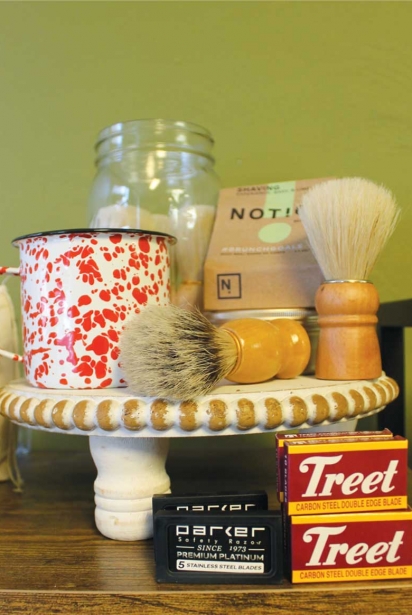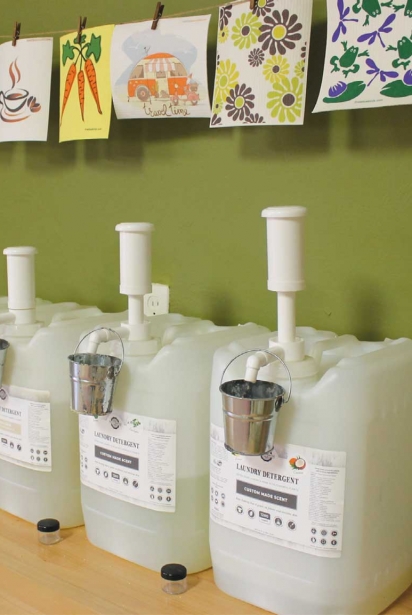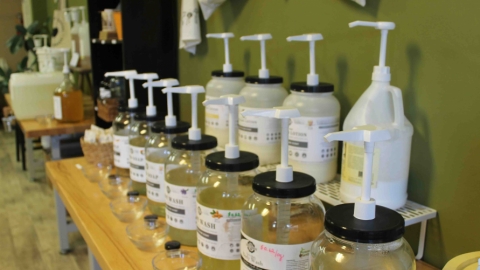Recycling Won't Solve Our Plastic Waste Problem
Even as she was invested in living more sustainably, Debra Cowdin was growing increasingly uncomfortable in seeing how full her family’s recycling bin was each week. That, coupled with watching Plastic Wars, a PBS “Frontline” documentary, Cowdin decided it was her time to contribute to the solution. After extensive research on the business model, she opened The ReFill in Newport in June 2022. Eager to adopt more environmentally sound practices myself, I made a recent visit to learn more about The ReFill’s product mix and retail ethos.
TURNING AWARENESS INTO ACTION
“How did I get to be 50 and not realize this was a problem?” wondered Cowdin, a former schoolteacher. “After seeing the documentary and knowing how much I contributed to the plastic mountains floating through oceans in Asia, it was hard to ‘unsee.’”
As Cowdin explained, Americans recycle only 9% of what we throw away, so we need to swap out “reduce, reuse, recycle” and adopt a “reduce, reuse, refill” lifestyle instead. “Quality products matter to our environment, our health and our economy,” she said.
Broadly speaking, the store’s products cost the same or a few cents more than such “green” cleaning brands as Seventh Generation (owned by Unilever, known to be one of the world’s top 10 plastic polluters) or Mrs. Meyer’s (owned by SE Johnson, which the Environmental Working Group gives a C rating) or “green” beauty brand Burt’s Bees (owned by Clorox and which is facing a class action lawsuit for containing toxic “forever chemicals”).
Cowdin spends much of her time researching truly green brands for her store. One such brand is Rustic Strength, which manufactures high-purity, toxin-free, plant-based cleaning and wellness products from a family-run factory in the Ozarks. Another is Heliotrope, a producer out of Northern California offering all-natural skincare products made in small batches using simple, organic ingredients.
THE IMPACT ON OUR OCEANS
With the Atlantic Ocean within spitting distance of The ReFill’s Newport storefront, I couldn’t resist asking the rhetorical question: “Do you feel like your efforts are no more than a drop in the ocean?”
Cowdin is a fan of Anne-Marie Bonneau, author of The Zero-Waste Chef: Plant-Forward Recipes and Ways to Reduce Waste for a Sustainable Kitchen and Planet, who said, “We don’t need a handful of people doing zero waste perfectly. We need millions of people doing it imperfectly.”
Sadly, our oceans are becoming holding zones for plastic waste. National data report startling––and deeply unappetizing––facts: We eat more than 40 pounds of plastic in our lifetimes; 100% of mussels tested contain microplastics and, by 2050, our oceans will be home to more plastics than fish.
The ReFill’s website notes that annually more than 552 million shampoo bottles land in the nation’s landfills—and that does not include plastic bottles for conditioners, lotions, body washes, dish soap, laundry jugs, cleaning supplies and more.
I’M NOT DOING NEARLY ENOUGH
I consistently use recyclable shopping bags, mesh bags for produce and laundry detergent sheets and reuse old jam jars for leftovers, but I’ve not yet abandoned the restaurant-style plastic tubs that our son, a former chef, recommended, or paper towels.
Cowdin reassured me, “We’re not anti-plastic here; we’re anti-more plastic, so we’re not in favor of people tossing all their plastic containers and buying something different.” Her recommendations: Use those plastic containers as long as you can, but don’t buy new plastic. Cut up old T-shirts or tea towels to use instead of paper towels. (Note to self: Get others in my household on board!)
The ReFill’s “better for the environment” options include products for kitchen, home and personal care, like these examples:
FOR THE KITCHEN:
FOR THE LAUNDRY ROOM:
• On a per load basis, the ReFill’s laundry detergents cost no more than average supermarket and box store brands
FOR THE ENTIRE HOUSE:
• The ReFill’s all-purpose cleaning solution can be used for bathrooms, floors, kitchens, etc., rather than multiple cleaning products that often contain hazardous chemicals
FOR PERSONAL CARE:
Cowdin’s suppliers create high-quality products, pay their employees fair wages and practice closed-loop packaging, where the refill product manufacturer refills the bulk packaging at its own facility before sending it back to the retail refillery. “We’ve been schooled to reach for the cheapest products,” said Cowdin, “and it takes time for people to understand [why our products may be pricier].” She also noted that the product cost for brands such as Tide or Seventh Generation would be much higher if they adopted the same responsible practices as brands she carries.
HOW DOES IT WORK?
The ReFill will fill any empty and clean container with a lid––from yogurt containers to gallon+ laundry detergent jugs––with its liquid products. And, for shoppers who visit container-less, The ReFill offers free, clean and empty containers. Cowdin weighs containers before and after filling them, so customers only pay for the product. Laundry detergent, shampoo/conditioner bars, deodorant and washable “paper” towels are among customers’ favorites.
MAKE ONE CHANGE AT A TIME …
Owner and sole employee of The ReFill, Cowdin cheerfully guides customers in assessing their options. “You don’t have to do it all at once,” said Cowdin, “just make one change at a time and … live your life with less plastic.”
Cowdin urges people to ditch their disposable razors, which contribute greatly to the world’s landfills, for The ReFill’s stainless-steel safety razor––a one-time, lifelong investment.
Before I bid Cowdin goodbye, I happily snapped up several colorful compostable Swedish dishcloths, which make great hostess gifts , and some body lotion, for me, which Cowdin pumped into one of The ReFill’s clean refillable bottles.
Nancy Kirsch is a freelance writer in Riverside, Rhode Island. Visit her at NancyKirsch.com.
The ReFill
42 Spring St., Newport, 508.496.8072; TheReFill.us








